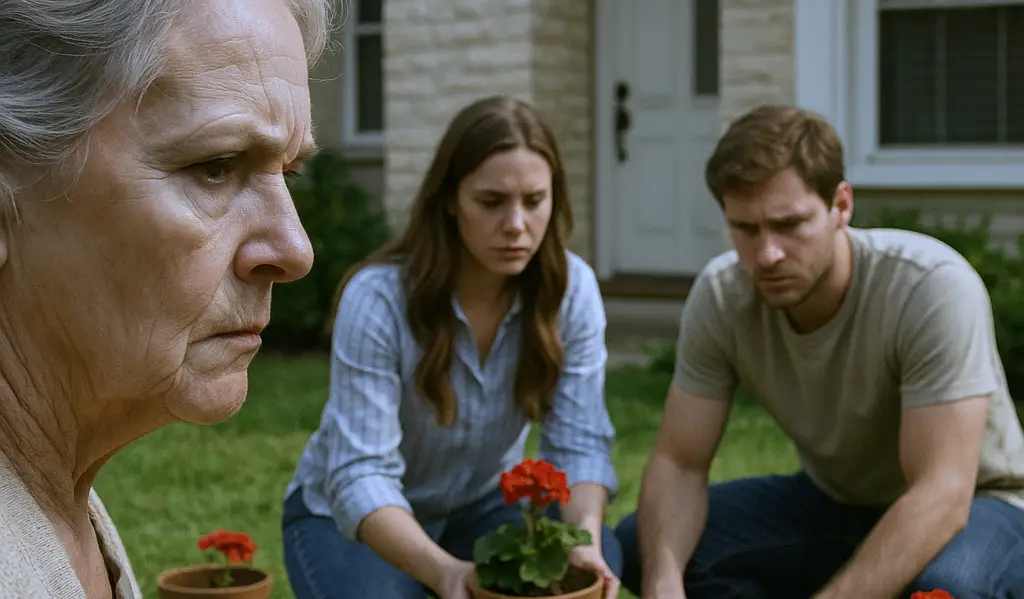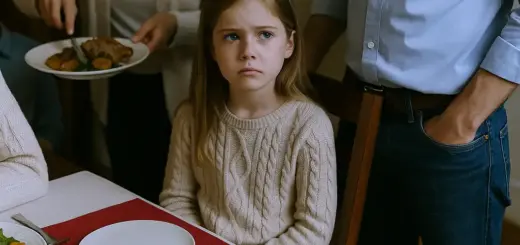«Don’t you dare argue with my wife in her house!» Ethan yelled at me with a fury I had never seen in his eyes before. But we were in my house. In the house I built brick by brick, working day and night for thirty years. I stood frozen in my own kitchen, feeling as if I’d been slapped. My son, my own son, was kicking me out of my own home to defend a woman he had only known for two years.

Rebecca was standing there with a triumphant smirk, her arms crossed, watching as Ethan humiliated me. It all started over something so simple. Rebecca had moved my garden plants without asking, and when I told her to please not touch my things without telling me first, she shot back that this was her house now too. When I tried to explain that I had been taking care of those plants for fifteen years, Ethan exploded as if I had insulted his wife.
My name is Marissa Miller. I’m sixty-nine years old, and that morning, I felt like I no longer recognized the son I had raised. The same little boy whose diapers I changed, who I spoon-fed until he was four because he was so picky, who I carried in my arms when he had a fever, now looked at me as if I were a stranger. I was born in a small town where mothers were respected until the last day of their lives, where sons took off their hats when speaking to their parents and never raised their voices. But here I was, in the big city, watching my own son disrespect me for a woman who didn’t even know my story.
When I was twenty-two, I came to this city with my husband, Andrew—may he rest in peace—and a baby in my arms. We had nothing but two old suitcases and the hope of giving our son a better life. Andrew worked in construction from five in the morning until eight at night, and I washed other people’s clothes at a public laundromat.
I remember the day we decided to buy this piece of land perfectly. It was a vacant lot full of rocks and weeds, but it only cost $3,000. Andrew told me, «Marissa, we’re going to build our home here.» And I believed him, even though it seemed impossible at the time. For the first five years, we lived in a tiny tin shack while we saved up for materials.
I sold homemade pies in the mornings, cleaned houses in the afternoons, and at night, I sewed red and green dresses for the ladies in the fancy part of town. Every dollar I earned, I put into a coffee can I hid under the mattress. Ethan was still little when Vincent, my second son, was born. With two children to feed and clothe, the money was never enough, but I never gave up. I would get up at four in the morning to bake, take the kids to school, go to work, come home to cook, and go to bed well after midnight, sewing.
When Andrew died in a work accident, Ethan was fifteen and Vincent was just twelve. I was left alone with two teenagers, a half-built house, and debts that seemed like mountains. But I never thought about giving up. I worked harder than ever before in my life. I sold food at the factory gates, washed clothes in the early morning, and babysat on weekends—anything to make sure my sons didn’t feel their father’s absence and could get an education to have the life I never had.
Ethan was always my pride and joy. He was smart, studious, and respectful. When he told me he wanted to be an engineer, I sold my sewing machine to pay for his college tuition. It was worth $1,000, and it was my tool for work, but I didn’t hesitate for a second. It was for my son’s education. For five years, I stayed up late ironing other people’s clothes to pay for his studies. My hands cracked and my back ached, but every time I saw Ethan with his books, I knew it was all worth it.
The day he graduated, I cried with happiness. My son was an engineer; my sacrifice had paid off. Vincent also did well for himself. He studied to be a computer technician and now works at a big company where he earns good money. He always visits me, brings me flowers, and asks how I’m doing. But Ethan… Ethan changed completely since he met Rebecca.
He met her at a work party two years ago. Rebecca is a divorced, 35-year-old woman with no kids who works in an office and is always very put together with her red dresses and high heels. From the first day he brought her home, I felt something strange in the air. It’s not that I didn’t want Ethan to get married; I always dreamed of seeing him happy with a good woman who truly loved him.
But Rebecca had a way of looking at my house as if it were too small, too old, too humble for her. Her eyes scanned my furniture with disdain, as if everything I had bought with so much effort was worthless. At first, it was small things. When she came for dinner, she always had a comment about the food: the sauce was too spicy, the rice was too watery, or they cooked differently at her old house. Ethan always defended her, telling me not to be so sensitive and that Rebecca was just trying to help.
One day, they came over and told me they were getting married. I was happy, of course, though I felt a strange pang inside. Ethan was my son, my companion, the only one left with me in this house since Vincent moved out on his own. But I swallowed my fears and supported them. I gave them the $3,000 I had saved up for a nice wedding. It was the money I had put away in case I ever got sick and needed expensive medicine, but I thought my son’s happiness was more important. Rebecca barely thanked me, as if it were my obligation to give them that money.
After the wedding, Ethan told me that he and Rebecca were going to stay in my house while they saved up to buy their own. I accepted gladly. I thought it would be wonderful to have our family together again, that maybe Rebecca and I could be like a mother and daughter, and that she would help me with the housework.
But from the very first day they arrived as a married couple, everything changed. Rebecca started moving my things without asking. She changed the living room curtains to some green ones she liked better. She moved my family photos to put up her own. She reorganized my kitchen her way, putting my pots in places I couldn’t reach. When I told Ethan to ask me before changing things, he would reply that Rebecca lived here now too and that she had a right to feel comfortable. But I didn’t understand why my comfort no longer mattered. It was my house, the house I had built with my own hands and my own sweat.
Rebecca started inviting her friends over without telling me. They would arrive in the afternoons, sit in my living room, drink coffee from my pantry, and talk about me as if I wasn’t there. They’d say things like what a shame it was that Ethan had to live in such an old house and that surely when they had kids, they’d need to move somewhere bigger and more modern. One afternoon, I overheard her telling a friend on the phone that living with her mother-in-law was very uncomfortable, that I controlled her too much, and that I didn’t let her do anything her way. It hurt so much to hear her talk about me like that when I had done everything possible to make her feel welcome.
Ethan started to change with me. He no longer asked how my day was. He no longer sat with me in the evenings to watch our TV shows as we used to. He no longer helped me with the heavy groceries. All his attention was on Rebecca, on making her happy, on giving her everything she wanted.
When I turned 69, they barely wished me a happy birthday. Before, Ethan always bought me a cake and brought me flowers. This time, Rebecca told him they should just take me to a cheap restaurant for dinner so they wouldn’t have to clean dishes at home. We went to a horrible place where the food tasted like cardboard, and it cost only $20 for the three of us.
I started to feel invisible in my own home. Rebecca would put the TV on whatever channel she wanted without asking. She would occupy the bathroom for hours in the morning, using up all the hot water. She filled the refrigerator with expensive food that only she ate, leaving less space for my things. When I tried to talk to Ethan about these problems, he would tell me I was exaggerating and that Rebecca was a hardworking woman who deserved respect. But I didn’t understand why respect for her meant disrespect for me.
One night, I heard them talking in their room. Rebecca was telling him that I was too controlling, that I didn’t let them live in peace, and that I was always meddling in their business. Ethan replied that I was just used to living alone and that in time, I would get used to having them there. But I wasn’t meddling in their business; I just wanted them to respect mine. I just wanted to keep feeling like my house was still my house, not a borrowed place where I was the awkward guest.
Rebecca started cooking only for herself and Ethan. She would make portions for two and tell me there were leftovers in the fridge from yesterday if I was hungry. I, who had cooked for my family for fifty years, now had to heat up cold food in my own kitchen. On weekends, they would go out together without inviting me. They went to the movies, to malls, to restaurants, and would come back late at night, telling jokes and laughing while I stayed home alone watching television. Before, Ethan and I used to go out together on Sundays. We’d go to the market, buy plants for the garden, and have breakfast at some street stand.
One day, I decided to address the problem directly. I told them I felt like I was no longer welcome in my own home and that we needed to set some rules so we could live together better. Rebecca looked at me with those cold eyes I knew so well and said that if I wasn’t comfortable with the situation, maybe I should find another place to live.
Ethan said nothing. He just stayed quiet, looking away as if the conversation had nothing to do with him. His silence hurt more than any shout. My own son was leaving me alone in this argument, allowing his wife to suggest I leave my own home. That night, I cried in silence, covering my face with a pillow so they wouldn’t hear me. It was the first time in many years that I felt completely alone and abandoned.
The following days were even worse. Rebecca had realized Ethan wasn’t going to defend me, so her behavior became more brazen. She started moving things around when I went out to run errands, as if she were marking her territory. One Tuesday, I came back from the market and found that she had moved all my garden plants. She had put them in a corner where they barely got any sun, telling me she needed that space for a new table and chairs she wanted to buy.
I had cared for those plants for fifteen years. Each one had its own story, its perfect spot where I knew it would thrive. When I explained that the plants would die in that corner, she told me that if I was so worried, I could give them to a neighbor. She talked about my plants as if they were trash in the way. Ethan was there listening to the whole conversation, reading his newspaper without saying a word.
I told Rebecca to please not move my things without asking me first, that this was my house and I had spent many years organizing it a certain way. I said that I understood she lived here now too, but that we could reach agreements without anyone feeling bad. That’s when Ethan lifted his head from the newspaper and looked at me with a face I had never seen on him. His eyes were full of rage, as if I had said something terrible. He jumped to his feet and walked towards me with his fists clenched.
























































